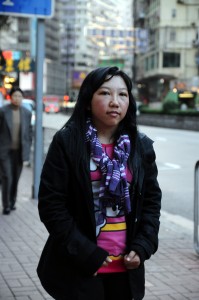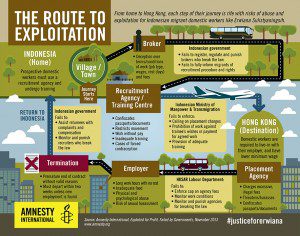
Indonesian domestic worker Erwiana Sulistyaningsih was named one of TIME magazine’s 100 most influential people of 2014, after her struggle for the rights of domestic workers. She was abused for more than seven months in the home of her Hong Kong employer, and returned to the city this month to give evidence against her former boss.
I come from a close-knit family – my parents, younger brother and me. A friend told me about the opportunity to work as a domestic worker in Hong Kong. We were all hopeful and excited. Hong Kong is well-known to be a developed and safe city. We also needed the money.
I was not able to leave immediately. It was a requirement to register with a recruitment agency and go through training. I soon found that this meant working for several households without pay. In Jakarta, I looked after an elderly woman who often hit me. I had been warned by the agency that I would not be sent to Hong Kong if I complained, so I kept quiet. I also had to work at my local recruiter’s household for two months.
After eight months, I boarded the plane to Hong Kong. I was nervous, but also excited that I would finally be able to earn money. There did not seem to be any cause for concern. My agency in Indonesia did not tell me about any risks, but assured me I could speak to their Hong Kong counterpart if I faced any problems. This is what I did, when the abuse by my employer quickly became clear. Shortly after, she confiscated my phone and locked me in her home.
A lack of food, sleep and moneyI had explained to the Hong Kong agency that my employer did not give me enough food or allow me to sleep much, and that I had not been paid. But the agency just told me to go back to her, as I had to pay off my debt for the agency fee. It never crossed my mind at that point that returning to my employer would result in me lying in a hospital bed back in Indonesia.
On 13 January 2014, my employer left me at the airport to make my way back to Indonesia. This was after she had physically abused me and made me a prisoner in her home for more than seven months. On top of that, she had not paid me any wages. I was in such a bad physical state that I could hardly walk, and would not have made it back to my home in East Java if a fellow Indonesian had not changed her flight in order to help me.

The pain I was in was intolerable, but nothing was worse than having my parents break down in tears when they saw me. I looked nothing like the daughter they had last seen– I was so bruised and scarred. Despite my concern about the cost, they insisted that I go to the hospital. That was my lowest point in the past year.
A difficult returnIt was difficult for me, returning to Hong Kong to testify against my former employer after what I had gone through here. I was nervous, but decided to come because I felt I had to seek justice, not just for myself, but also for other domestic workers who have faced similar situations. Attending court for the six-week duration of the trial was very trying. Not only did I have to face the person who had so badly mistreated me, but her lawyers also accused me of inventing stories for publicity. That really saddened me; I was the one who had gone through the ordeal, yet I was accused of lying.
My experience over the past year has definitely transformed me. I was previously naïve and scared of standing up for myself, but I have now learned so much about labour laws. I am now more confident about defending my rights. All domestic workers should be similarly informed, particularly newcomers who are especially vulnerable since so much depends on their luck in having a good employer. My experience only reflects the lack of protection for domestic workers. I hope the Hong Kong authorities will pay more attention to this issue.
Speaking upIn my darkest moments, it was the messages of support sent by other domestic workers that gave me great comfort. In turn, I now speak publicly about my ordeal. I’ve spoken with leaders of different Indonesian organizations based in Hong Kong, at community events in Indonesia and at a regional event supported by UN Women.
I am happy that I won my case and justice for me and other victims is finally upheld. The only reason we Indonesian domestic workers come to Hong Kong is to help our families. I speak up so no one will have to go through the same suffering.
On 10 Feb 2015, Erwiana’s former employer Law Wan-tung was found guilty of abusing Erwiana and another migrant domestic worker. Thanks to a scholarship, Erwiana is now studying for a business qualification at an Indonesian university and hopes to continue helping migrant workers.
The human and labour rights abuses commonly faced by Indonesian domestic workers like Erwiana were documented by Amnesty International in the 2013 report, Exploited for Profit, Failed by Governments: Indonesian migrant domestic workers trafficked to Hong Kong (PDF).


